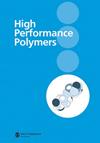Evaluation of augmented thermal, thermo-mechanical, mechanical properties of nano alumina reinforced TGDDM epoxy nanocomposites
IF 1.6
4区 化学
Q3 POLYMER SCIENCE
引用次数: 1
Abstract
N,N′-Tetraglycidyldiaminodiphenyl methane (TGDDM) was reinforced with various weight fractions (0.5, 1, and 1.5 wt%) of amine functionalized nano alumina (F-Al) were cured with diaminodiphenyl-methane (DDM). FT-IR analysis revealed that formation of functionalized nano alumina (F-Al) structure, was brought about via coupling agent APTES. Furthermore, the morphology of TGDDM epoxy nanocomposites was studied using X-ray Diffraction (XRD), scanning electron microscopy (SEM), transmission electron microscopy (TEM), microscopic analysis and an atomic force microscope (AFM). We found a bonding relationship between TGDDM epoxy and F-Al in TGDDM/F-Al nanocomposites It was interesting to note that the values of tensile, flexural and impact strength of 1 wt% F-Al reinforced TGDDM epoxy nanocomposites were found to be 141.5, 192.5 MPa, and 92.4 J/m2, respectively., which resulted in a substantial improvement in the dynamic mechanical analysis (DMA) to 4.3 and 5.5 for 0.5 and 1 wt% F-Al reinforced TGDDM epoxy nanocomposites and the glass transition temperature (Tg) increased from 210°C to 225°C as the F-Al content increased. The initial degradation temperature (IDT) of 0.5, 1, and 1.5 wt% F-Al reinforced TGDDM epoxy nanocomposites were significantly enriched to 328°C, 345°C, and 335°C respectively from 290°C of neat (TGDDM) epoxy matrix. Likewise, the char yield for the neat (TGDDM) epoxy matrix was 13% and that for 0.5, 1, and 1.5 wt% F-Al reinforced TGDDM epoxy nanocomposites were 17%, 25%, and 20% respectively. It is feasible to state unequivocally that considerable F-Al diffusion within the TGDDM epoxy can only occur at low weight percentages. The results clearly showed that F-Al reinforced TGDDM epoxy nanocomposites may be investigated for advanced high performance industrial engineering applications.纳米氧化铝增强TGDDM环氧树脂纳米复合材料增强热、热机械和力学性能的评价
N、 用不同重量分数(0.5、1和1.5wt%)的胺官能化纳米氧化铝(F-Al)增强N′-四缩水甘油基二氨基二苯基甲烷(TGDDM)。FT-IR分析表明,功能化纳米氧化铝(F-Al)结构的形成是通过偶联剂APTES实现的。此外,利用X射线衍射(XRD)、扫描电子显微镜(SEM)、透射电子显微镜(TEM)、微观分析和原子力显微镜(AFM)对TGDDM环氧树脂纳米复合材料的形貌进行了研究。我们在TGDDM/F-Al纳米复合材料中发现了TGDDM环氧树脂和F-Al之间的键合关系。值得注意的是,发现1wt%的F-Al增强TGDDM环氧纳米复合材料的拉伸、弯曲和冲击强度分别为141.5、192.5 MPa和92.4 J/m2。,这导致0.5和1wt%的F-Al增强的TGDDM环氧树脂纳米复合材料的动态力学分析(DMA)显著提高到4.3和5.5,并且随着F-Al含量的增加,玻璃化转变温度(Tg)从210°C增加到225°C。0.5、1和1.5wt%的F-Al增强TGDDM环氧纳米复合材料的初始降解温度(IDT)分别从纯(TGDDM)环氧基体的290°C显著富集到328°C、345°C和335°C。同样,纯(TGDDM)环氧树脂基体的炭产率为13%,0.5、1和1.5wt%的F-Al增强TGDDM环氧树脂纳米复合材料的炭产率分别为17%、25%和20%。可以明确指出,TGDDM环氧树脂中的大量F-Al扩散只能在低重量百分比下发生。结果清楚地表明,F-Al增强TGDDM环氧树脂纳米复合材料可用于先进的高性能工业工程应用。
本文章由计算机程序翻译,如有差异,请以英文原文为准。
求助全文
约1分钟内获得全文
求助全文
来源期刊

High Performance Polymers
化学-高分子科学
CiteScore
4.20
自引率
14.30%
发文量
106
审稿时长
1.2 months
期刊介绍:
Health Services Management Research (HSMR) is an authoritative international peer-reviewed journal which publishes theoretically and empirically rigorous research on questions of enduring interest to health-care organizations and systems throughout the world. Examining the real issues confronting health services management, it provides an independent view and cutting edge evidence-based research to guide policy-making and management decision-making. HSMR aims to be a forum serving an international community of academics and researchers on the one hand and healthcare managers, executives, policymakers and clinicians and all health professionals on the other. HSMR wants to make a substantial contribution to both research and managerial practice, with particular emphasis placed on publishing studies which offer actionable findings and on promoting knowledge mobilisation toward theoretical advances. All papers are expected to be of interest and relevance to an international audience. HSMR aims at enhance communication between academics and practitioners concerned with developing, implementing, and analysing health management issues, reforms and innovations primarily in European health systems and in all countries with developed health systems. Papers can report research undertaken in a single country, but they need to locate and explain their findings in an international context, and in international literature.
 求助内容:
求助内容: 应助结果提醒方式:
应助结果提醒方式:


